
When Israeli security forces last Friday used drones to drop tear gas on tens of thousands of Muslim worshippers at Al-Haram Al-Sharif, it provided yet another sign of the Israeli government’s bankrupt policy. The use of drones to manage the huge crowd on the third Friday of Ramadan was even criticized by the Israeli media. Haaretz correctly noted the targeting of women and children in the yard outside Al-Aqsa Mosque, Islam’s third holiest site. By targeting what Israel called “provocateurs,” the Israeli security forces showed a racist policy that is against everything Palestinian and Muslim, the newspaper argued.
Ironically, the same security forces also dealt with last week’s unauthorized flag march by Israeli extremists, during which they used kid-glove treatment, blocking the march’s advance only with their own bodies and refraining from the use of any other means of crowd control.
But the use of drones reveals a much bigger problem. When dealing with large crowds of protesters, a two-tiered approach is normally taken. One needs to keep far away from any friction that could further aggravate the situation, while at the same time trying to find ways to communicate or address the issues that the protesters are trying to raise through their actions.
However, this approach does not appear to exist in the Israeli playbook when it comes to Al-Haram Al-Sharif. The compound, spanning some 35 acres in Jerusalem’s Old City, has been a Muslim shrine for more than 1,200 years (except for an 88-year period of crusader rule). Every power that has ruled Jerusalem has respected the Islamic holy site and allowed Muslims to carry out their prayers. No one has ever questioned the issue.
During the Ottoman period, which lasted 400 years, Sultan Osman III regulated relationships regarding nine shared holy sites in Jerusalem and Bethlehem through the designation of the Status Quo pact. This agreement, which came about due to conflict over the Church of the Holy Sepulchre between the Orthodox and the Franciscans, has been the reference point for the holy places since its adoption in 1757. After the collapse of the Ottoman Empire, the agreement was followed to the word under the British Mandate, by the Jordanians and even in the early years of the Israeli occupation.
However, the shift in Israeli politics to the right and the failure of the Oslo Accords to provide clear representation for Jerusalem’s 350,000 Palestinians left a gap that has been abused by Israel. Instead of allowing local leadership to grow, giving them someone to talk to when things got hot, the Israelis have conducted a scorched-earth policy toward Palestinian nationalism. Any action or event that has a hint of connection to the Palestinian leadership in Ramallah has been banned. Even a children’s puppet festival that was funded by Scandinavians through the Palestinian Ministry of Culture was outlawed.
Instead of allowing local leadership to grow, the Israelis have conducted a scorched-earth policy toward Palestinian nationalism.
Daoud Kuttab
At the same time, Israel has barred some 35 organizations. Not only was Orient House closed by means of British Mandate-era emergency regulations, but organizations such as the Jerusalem Chamber of Commerce, the Tourism Council and others were banned from operating for six-month periods that have been renewed regularly since 2001. Every activity that would provide Palestinians with a political voice has been barred. Even absentee elections that are mandated as part of the Oslo Accords have been prohibited by the current Israeli government.
While shutting down any means of communication and preventing political representation, Israel has dealt with the huge crowds, especially during Ramadan, with unprecedented force. This includes the use of drones following the April 15 storming of Al-Aqsa Mosque, damaging historic windows at the mosque, defiling a holy place with the boots of soldiers, and injuring 170 Palestinians and arresting 450 simply to make it possible for Jews to visit.
Such visits were approved in principle in a 2014 understanding between Jordan and Israel, which was guaranteed by the US, that said the site is for Muslims to pray and for all others to visit. Previous Israeli governments avoided visits during Ramadan, when increased numbers of Muslims come to pray and often stay for long hours. Last Friday, the number of worshippers exceeded 150,000. Many stayed until evening prayers, but Israel wanted the crowds thinned out as it feared they might disrupt Jews at the Western Wall who were celebrating the last day of Passover.
Had there been trust, respect and local leadership, some of these issues could have been resolved through communication. However, with a lack of trust and absent any political horizon to solving the larger problem of occupation (which includes East Jerusalem), the Israeli government applied a security-only approach with disastrous results. This attitude will continue to plant the seeds of hate.
• Daoud Kuttab is an award-winning Palestinian journalist from Jerusalem.
Twitter: @daoudkuttab











